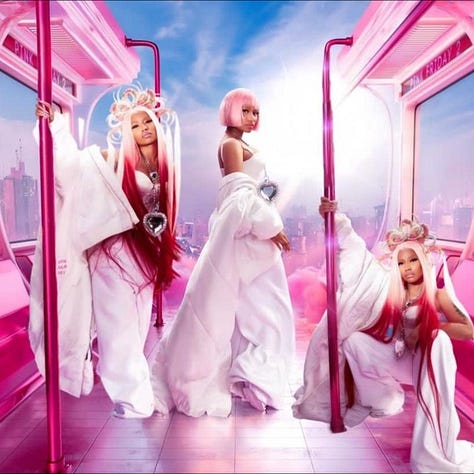Xgau Sez: January, 2024
Radiohead and the pitfalls of prog, an executive decision, the remarkable Ms. R, cannibalizing great songs, the uncollected Consumer Guide, and the varieties of musical experience.



Hi Robert, Long-time fan here. With the frightening advancements in AI and more dependence on interconnectivity than ever, do you believe that Radiohead’s OK Computer is more impactful than you originally gave it credit for? It seems as though this album in particular is a shared favorite amongst Gen Z for these reasons as they grew up alongside rapid technological connectivity that this album so heavily preached against. You described the album as, “arid.” Given the fact it has been able to transcend and grow to reflect a new generation who arguably enjoys it more than the one in which it came out in, would you still say that today? — Quindarious, Flint, Michigan
Just reread my OK Computer CG brief as well as listening to the thing again and failed to register the anti-computer preachments to which you refer, which doesn’t mean they’re not there—I’ve never found the band’s lyrics compelling enough to follow religiously—but does likely mean that they’re more pretentiously subtle than “heavily preached.” My guess is that Thom Yorke, whose political activism and general sense of principle I very much admire, didn’t intend anything as blatantly ideological as you suggest. I believe the band’s popularity, which these days is better designated “status,” is based much more on its prog aesthetic than on its progressive politics. To my way of thinking this is one of the pitfalls of what I’ll just call art-rock, which actively rejects both the catchy hooks and the compelling groove of the rock and roll aesthetic I’ve championed for most of my life. Moreover, I believe that the band’s rejection of that aesthetic in favor of more cerebral songwriting and subtle execution is, together with their enthusiastically received live shows, why their fans love them so—insofar as they still do, since their productivity has definitely flattened out in recent years.
Respectfully, what is your review of the full 22-track version of Pink Friday 2? — Nicholas Wanhella, North Vancouver, BC
In the wake of Minaj’s confusingly variegated 2023 output I’ve made an executive decision that when an artist releases a new album in multiple versions, I’m only obliged to review one. In this case I did what I usually do—buy, with my own money, a physical from Amazon. The one that came in the mail and I wrote about didn’t even have a booklet—just a square, almost info-free 4.7”X4.7” slip of paper. It got the level of attention I estimated it had earned. The album was good, but definitely an A minus rather than full A. My working assumption is that the “full 22-track version” is longer and quite possibly as good but very unlikely to be substantially better. I don’t think Minaj is so iconic she merits the extra attention.
Hi Bob, with Guts already my most played album in years and Olivia Rodrigo just about my favourite artist on the planet, I wondered if you’d care to expand a little on your two glowing capsule reviews. Just how good/great do you currently rate her? Think she can keep this going? Planning on seeing her live in 2024? — Trevor Minter, Shoreham-by-Sea, West Sussex, United Kingdom
With an artist as gifted as Rodrigo, predicting the future is difficult to impossible, although it is worth noting, as she does in the notes to Guts, that she works with an experienced collaborator named Daniel Nigro who it’s safe to assume transformed at least a few good songs into great ones. Also worth remembering is that thus far she’s been free to write as something approaching what she is: a remarkable young woman whose professional life and love life are both bound to become more complicated, with who knows what effect on the songs she writes except that just because the writing has been so consistent up till now a few unresolved twists and complication or for that matter some sort of satisfactory resolution or turmoil in her romantic interpersonals likely awaits her, with unpredictable effects on her art itself—although just because she’s so talented it’s not at all impossible that her next bunch of songs at least will be more complex and unexpected than is within our power to anticipate.
What’s your gut reaction when you hear a well-known song or artist being used to sell a commercial product? Is this practice simply morally wrong, or are there examples of positive synergy? — Andrew Maslar, Baltimore
As a general matter, there’s nothing morally wrong about cannibalizing a great song for a commercial, and yes I said cannibalizing. A lot of musicians feel they don’t get paid enough for their work, and many of them have a point. So I don’t even think twice about it, which may be why I can’t even cite a relatively offensive example. A gravity knife? A Kid Rock Trump anthem? A conspicuously pricey timepiece? An AK-47? Some oxygen-sucking SUV I can’t even name?
Hi, Bob! I love your work—own all your books, but still find myself using your huge website a lot even though I own it all in print. It’s addictive. I wonder if you could comment on your decision-making about putting so much of your work online for free. Do you think it has hurt total book sales? Helped them on balance? It’s an interesting choice that I imagine many authors have to think about. — Henry, Brooklyn
Critics do not make meaningful money from their books if they’re lucky enough to have a few, and this applies especially to criticism per se—bios and to a lesser extent historical studies are somewhat different. Also, like all writers critics want to be read, to have their carefully honed analyses and opinions be a part of public discourse so that guys like you can share them or elaborate them. Hence I didn’t think twice when my old friend and in some respects protegee Tom Hull made the tremendously generous offer to create a website for me back in 2001, which I should mention now included 24 years of Consumer Guides that have never achieved book form. If he hadn’t, and if Wikipedia hadn’t gleefully cited and sometimes cannibalized it, I wouldn’t be making a remarkably decent living on Substack, which at least for the nonce I am. A fulltime writer at 81. I’m very fortunate.
First of all, thank you very much for your concise and precise writing. My question concerns the relationship of this writing (and the research that fuels it) and your enjoyment of the music you critique. I am an academic who writes on cultural production—thus far, primarily comics, though I am beginning to branch out into music (primarily classical). I find my close engagement with a work (perhaps a piece of music or an album), through research, close listening, etc., to have a significant effect on how I listen to/hear it. This effect is neither clearly negative nor positive, but rather more complicated. What are your thoughts on this relationship? A related follow-up: Are there albums you hesitate to listen to closely for fear that this attention will significantly (and perhaps irreversibly) change how you experience them? — John Benjamin, Nanuet, New York
I think my most important gift as a critic is how intensely, variously, and most important voraciously I respond to music. That said, it’s far more common for such responses to be enhanced and intensified by analyzing and listening critically, a process generally jump-started by what begins as more casual or incidental enjoyment. But the opposite certainly happens sometimes—I come to realize that I’ve been attracted only to a single song or two, or even that I’ve gotten tired of or seen through the track that initially pulled me in.


